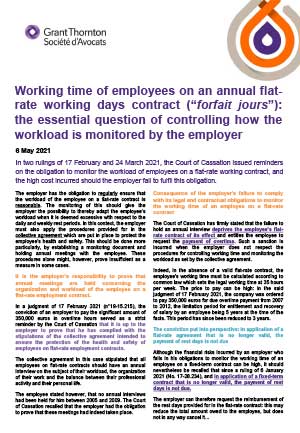-
Tax Policy Management
Tax Policy Management
-
Growth Management
Growth Management
-
Tax audit and litigation
Tax audit and litigation

-
Definition of a strategic and secure transfer pricing structure
Definition of a strategic and secure transfer pricing structure
-
Assistance in the development of international activities and operational reorganisations – “Business restructuring”
Assistance in the development of international activities and operational reorganisations – “Business restructuring”
-
Defense of practices and assistance in the context of tax audits and their follow-up from a litigation viewpoint
Defense of practices and assistance in the context of tax audits and their follow-up from a litigation viewpoint
-
Annual declaration and documentation obligations
Annual declaration and documentation obligations

-
Domestic and international VAT applicable to your company's flow
Domestic and international VAT applicable to your company's flow
-
Banking and financial VAT, VAT in the insurance sector
Banking and financial VAT, VAT in the insurance sector
-
VAT related to real estate registration fees
VAT related to real estate registration fees
-
VAT in the public and non-profit / association sector
VAT in the public and non-profit / association sector
-
Tax audit, tax litigation and relations with the Tax authorities
Tax audit, tax litigation and relations with the Tax authorities
-
Applicable rules for invoicing
Applicable rules for invoicing
-
Customs issues related to your company's international flows
Customs issues related to your company's international flows
-
French VAT registration and compliance obligations
French VAT registration and compliance obligations
-
Payroll tax
Payroll tax
-
Other indirect taxation
Other indirect taxation

-
Company transfer diagnosis
Company transfer diagnosis

-
Distribution strategy : Implementing and structuring
Distribution strategy : Implementing and structuring
-
Distribution activities digitalisation
Distribution activities digitalisation
-
Relations between suppliers and distributors
Relations between suppliers and distributors
-
Contractual policy : etablishing and structuring
Contractual policy : etablishing and structuring
-
Controls and litigation regarding payment terms
Controls and litigation regarding payment terms
-
Organising and securing commercial relations with consumers
Organising and securing commercial relations with consumers
-
Data protection - GDPR
Data protection - GDPR
-
Commercial Leases
Support in the management and contract management of commercial leases.

-
Traditional Services offered
Traditional Services offered
-
Health at work and quality of life at work
Health at work and quality of life at work
-
HR Management Audit
HR Management Audit
-
HR Engineering and People Change
Implementing managerial solutions in line with the company's strategic challenges
-
Management of HR compliance and internal investigations (harassment, discrimination, and whistleblowing)
Management of HR compliance and internal investigations (harassment, discrimination, and whistleblowing)

-
Advice on legal structuring
Advice on legal structuring
-
Day to day company management
Day to day company management
-
Companies reorganisation
Companies reorganisation
-
Mergers & Acquisitions - Private Equity
Mergers & Acquisitions - Private Equity
-
Changes in shareholder structure - Securities issue
Changes in shareholder structure - Securities issue
-
Governance and legal risks management
Governance and legal risks management

-
Development of an international mobility policy
Development of an international mobility policy
-
Coordination of reporting obligations for employees in a mobility situation
Coordination of reporting obligations for employees in a mobility situation
-
Advice on social security
Advice on social security
-
Assistance in labour law
Assistance in labour law

-
Management and protection of your portfolio of property rights
We put the most appropriate protection policy in place for our clients’ intellectual property rights.
-
Securing your projects: advisory and drafting of agreement services
We advise you on the feasibility of your project and the securing of your intellectual property and IT rights.
-
Enforcement of your rights: pre-litigation and litigation
Enforcement of your rights: detection of infringement, pre-litigation and litigation

In two rulings of 17 February and 24 March 2021, the Court of Cassation issued reminders on the obligation to monitor the workload of employees on a flat-rate working contract, and the high cost incurred should the employer fail to fulfil this obligation.
The employer has the obligation to regularly ensure that the workload of the employee on a flat-rate contract is reasonable. The monitoring of this should give the employer the possibility to thereby adapt the employee’s workload when it is deemed excessive with respect to the daily and weekly rest periods. In this context, the employer must also apply the procedures provided for in the collective agreement which are put in place to protect the employee's health and safety. This should be done more particularly, by establishing a monitoring document and holding annual meetings with the employee. These procedures alone might, however, prove insufficient as a measure in some cases.
It is the employer’s responsibility to prove that annual meetings are held concerning the organization and workload of the employee on a flat-rate employment contract.
In a judgment of 17 February 2021 (n°19-15.215), the conviction of an employer to pay the significant amount of 350,000 euros in overtime hours served as a strict reminder by the Court of Cassation that it is up to the employer to prove that he has complied with the stipulations of the collective agreement intended to ensure the protection of the health and safety of employees on flat-rate employment contracts.
The collective agreement in this case stipulated that all employees on flat-rate contracts should have an annual interview on the subject of their workload, the organization of their work and the balance between their professional activity and their personal life.
The employee stated however, that no annual interviews had been held for him between 2005 and 2009. The Court of Cassation recalled that the employer had the obligation to prove that these meetings had indeed taken place.
Consequence of the employer's failure to comply with its legal and contractual obligations to monitor the working time of an employee on a flat-rate contract
The Court of Cassation has firmly stated that the failure to hold an annual interview deprives the employee’s flat-rate contract of its effect and entitles the employee to request the payment of overtime. Such a sanction is incurred when the employer does not respect the procedures for controlling working time and monitoring the workload as set by the collective agreement.
Indeed, in the absence of a valid flat-rate contract, the employee's working time must be calculated according to common law which sets the legal working time at 35 hours per week. The price to pay can be high: in the said judgment of 17 February 2021, the company was ordered to pay 350,000 euros for due overtime payment from 2007 to 2012, the limitation period for entitlement and recovery of salary by an employee being 5 years at the time of the facts. This period has since been reduced to 3 years.
The conviction put into perspective: in application of a flat-rate agreement that is no longer valid, the payment of rest days is not due
Although the financial risks incurred by an employer who fails in his obligations to monitor the working time of an employee on a fixed-term contract can be high, it should nevertheless be recalled that since a ruling of 6 January 2021 (No. 17-28.234), and in application of a fixed-term contract that is no longer valid, the payment of rest days is not due.
The employer can therefore request the reimbursement of the rest days provided for in the flat-rate contract: this may reduce the total amount owed to the employee, but does not in any way cancel it...
The employer cannot merely apply the provisions of the collective agreement if these are not adequate in guaranteeing regular monitoring of the workload of an employee on a flat-rate contract
In a ruling of 24 March 2021 (No. 19-12.208) the Court of Cassation also restated that the monitoring procedures of workload provided for in the collective agreement may be insufficient, and that in such a case the employer has the obligation to do more.
The Labour Chamber of the Court of Cassation considered that the obligations of the employer cannot be limited to a simple application of the provisions of the collective agreement without ensuring that these provisions are such as to guarantee that both the time worked, and the workload of employees are reasonable.
The case law thus tightens the obligations of the employer.
In this case, it was not sufficient enough for the collective agreement to provide:
- that the head of the establishment has the obligation to ensure that the workload of the managers concerned by the reduction in working time is respected;
- that managers have a daily rest period of at least 11 consecutive hours, that they cannot work more than 6 days a week and that they are granted a weekly rest period of 35 consecutive hours;
- without putting in place regular and effective monitoring to enable the employer to correct in good time any workload that may not respect the provision of reasonable working hours.
These provisions in themselves are not sufficient as to ensure that the working hours and workload remain reasonable.
Consequently, the employer who limits himself to merely applying the conventional provisions when these do not allow for a real verification of the workload of the employee on a flat-rate contract, does not fulfil his obligations to control the workload of the employee. The employer is, therefore, liable to pay the overtime due.
The means of monitoring the workload of an employee on a flat-rate contract as admitted by the case law
The employer should therefore be vigilant: the fact to hold a simple annual or quarterly interview is alone, insufficient.
Such meetings must be complemented by the establishment of a supervisory document.
The Court of Cassation has validated the fact of monitoring by a supervisory document, provided that this document is prepared by the line manager (or the employee if it is coupled with monitoring by the employer in order to avoid any work overload). Any procedures of self-reporting without supervision by a line manager is excluded.
Flat-rate working time contracts remain interesting as a way of organizing working time, subject to their implementation being well managed by the company.
***
Grant Thornton Société d’Avocats remains at your disposal to assist you in the respect of your obligations.

















